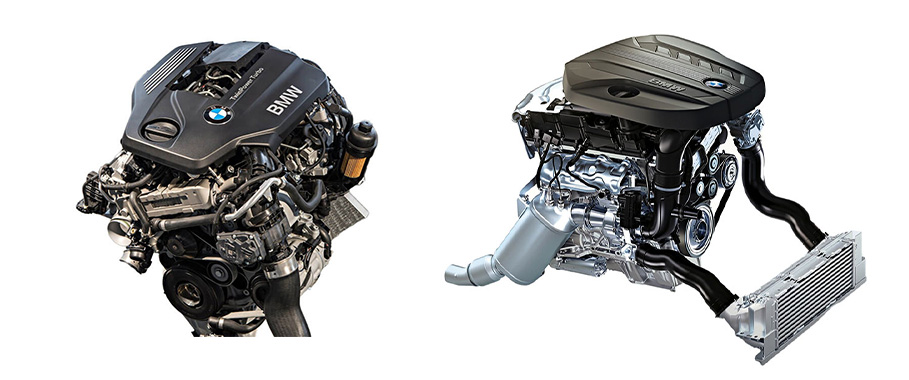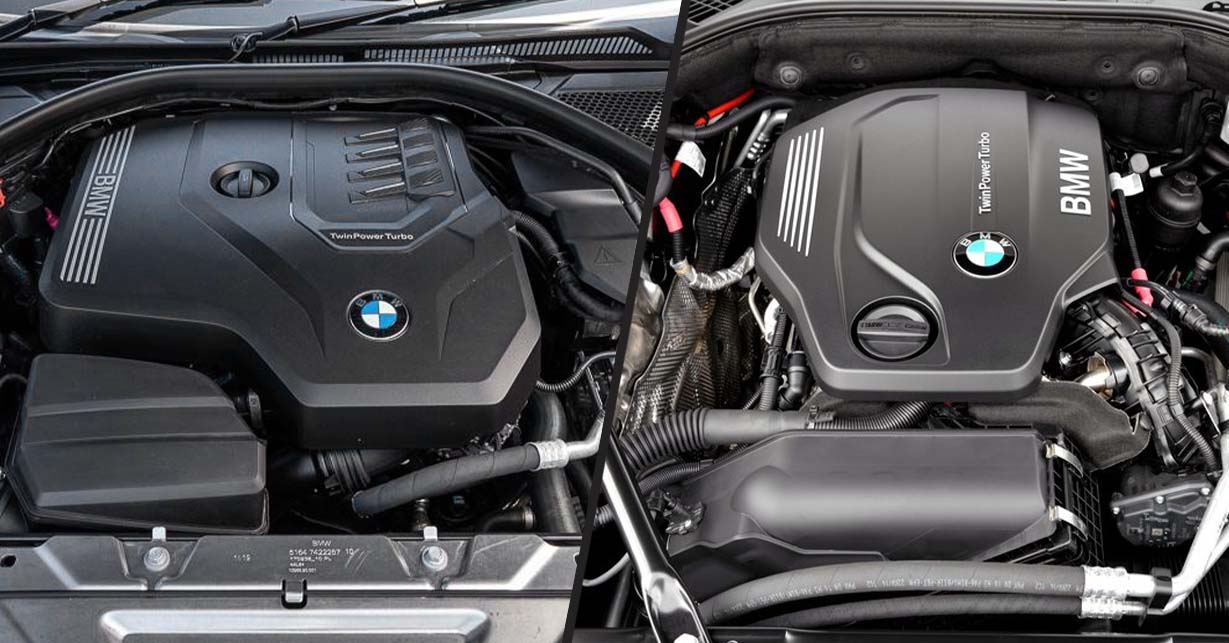The B48 is a turbocharged 4-cylinder gasoline engine that replaced the N20, while the B47 is a 4-cylinder turbo diesel engine that replaces the N47 engine. Both engines are part of the new modular BMW engine family and power many vehicles ranging from the small 1-Series to the massive X5. They bring significant improvements over their predecessors in terms of power, efficiency, and refinement.
How does the B48 stand against the B47 in terms of horsepower and torque, power delivery, tuning and modifications, exhaust sound, fuel efficiency, and reliability? BMW B48 vs. B47 comparison:
BMW B48 vs. BMW B47 Specifications

| BMW B48 (B48B20) | BMW B47 (B47D20) | |
|---|---|---|
| Configuration | Inline-4 | Inline-4 |
| Displacement | 2.0 L (1998 cc) | 2.0 L (1995 cc) |
| Horsepower | 255 hp @ 5,000 – 6,500 RPM (G20 330i) | 188 hp @ 4,000 RPM (G20 320d) |
| Torque | 295 lb-ft @ 1,550 – 4,400 RPM (G20 330i) | 295 lb-ft @ 1,750 – 2,500 RPM (G20 320d) |
| Bore & stroke | 82.0 mm x 94.6 mm | 84.0 mm x 90.0 mm |
| Compression ratio | 11.0:1 | 16.5:1 |
| Turbocharger | Single twin-scroll turbo | Single-turbo or twin-turbo |
| Fuel type | Gasoline | Diesel |
B48 vs B47: Horsepower & Torque
The most common version of the BMW B48 produces 255 horsepower and 295 lb-ft of torque. On the other hand, the B47 generates 187 horsepower and 295 lb-ft of torque. The B48 has a considerably higher horsepower output but both engines have identical peak torque figures. The B48 reaches peak torque between 1,550 and 4,400 RPM, whereas the B47 reaches peak torque between 1,750 and 2,500 RPM.
The B48 is the more powerful engine out of the two
The B48 has a significant advantage in horsepower, with around 37% more hp. Although you most likely won’t notice the difference between both engines driving around town, once you bring the revs above 3,500 RPM, the B48 will show a clear advantage over the B47. Conversely, despite the seemingly equal torque output, the B47 will feel like an engine with more torque and a better low-end grunt, as expected from a modern turbocharged diesel.
B48 vs B47: Power Delivery
Power delivery in the B48 and B47 is quite different. The B48 is a torquey engine that shines in the mid-range, with excellent upper-range RPM power that puts the B47 to shame, quite impressive for a 2.0L inline-4 engine. The B47, on the other hand, offers a lot of torque down low, making it great for city driving and efficient highway cruising. However, its power starts to taper off in the upper RPM range, starting to die above 4,000 RPM.
The gasoline B48 has a clear advantage in the upper range of the RPM range
Both engines have a relatively linear power curve, with the B48 offering more consistent power throughout the entire RPM range. The B48 and the B47 have minimal turbo lag; BMW knows how to tune turbocharged engines to keep power delivery as linear as possible.
B48 vs B47: Tuning & Modifications
When it comes to tuning and mods, the B48 has an advantage. Horsepower gains can be achieved with just a high-flow or catless downpipe and a respective ECU tune, making it the better choice for those looking to extract the most performance possible out of the engine. However, don’t expect earth-shattering performance. If you’re a horsepower junkie, we recommend you opt instead for a B58-powered car.
If you plan to tune and modify the engine, the B48 is a better option
The B47 also responds well to tuning, but the potential for increased power is more limited. Some common modifications for the B47 include a less restrictive exhaust system, an ECU tune, and upgraded turbochargers. However, don’t expect the same level of horsepower gains as with the B48.
The B48 has a larger tuning community, more aftermarket parts available, and is simpler to modify. The diesel B47 is at a disadvantage as you would need to remove or significantly modify the complex diesel emission system for significant power gains.
B48 vs. B47: Exhaust Sound
Without a doubt, the B48 has a better exhaust note compared to the diesel B47. Neither engine produces the most pleasant sounds, the B48 offers a more refined and enjoyable exhaust sound for enthusiasts. The B48 has a noisy drivetrain, and noisy injectors; it can sound a bit diesel-like when it is cold and idling. Wide open throttle, however, its exhaust sounds the right amount of loud with aggressive pops on upshift.
The B48 has a better exhaust note than the B47
It’s difficult for a 4-cylinder diesel engine to produce a pleasant exhaust note. Although the B47 sounds more refined than its predecessor, most drivers won’t find its sound inside and outside the cabin appealing.
B48 vs B47: Fuel Efficiency
The B47 has an advantage in terms of fuel efficiency, especially on the highway. The BMW G20 330i, equipped with the B48 engine, is rated at 29 US MPG combined city/highway. The G20 320d, powered by the B47, is rated at 46 US MPG combined. The B47’s diesel efficiency makes it the best option for those focused on fuel economy or for those who take frequent long road trips or have long commutes.
The B47 is more fuel efficient than the B48
Part of the excellent fuel efficiency of these two engines can be attributed to the 8-speed ZF automatic transmission. It helps keep RPMs low when cruising and quickly downshift when more power is needed.
Note that bigger vehicles such as a 5-Series or an X3 might not achieve the same fuel economy as the figures listed above due to higher weight and increased aerodynamic drag.
B48 vs B47: Reliability & Common Issues
Both the B48 and the B47 have proven to be reliable engines so far with no major issues. BMW corrected the timing chain issues that plagued the predecessors of both the B48 and the B47, and preventive timing chain replacement is no longer needed for either of the engines. Both of these engines are closed-deck, which should make them very robust in the long term.
Coolant loss, oil leaks, failing water pumps, and issues with the VANOS system are a few problems that could arise over time in both engines. Keeping a close eye on your engine bay would be a good idea, as usual for any high-mileage BMW. Having to replace the turbocharger at very high mileage (150,000+ miles) wouldn’t be out of the ordinary.
We think the B48 will be more reliable at very high mileage, as it does not have the complex diesel emission systems found in the B47 to be compliant with Euro 6 emission standards.
Conclusion: Is the B48 better?
The B48 and B47 engines are both excellent choices within BMW’s lineup, with a great balance of fuel efficiency and power.
The B48 petrol engine delivers more horsepower, a refined exhaust note, and has a better tuning potential, making it an attractive option for those seeking the best performance. Its fuel efficiency is also respectable for a petrol engine of its power output, although the B47 is the more efficient engine out of the two.

